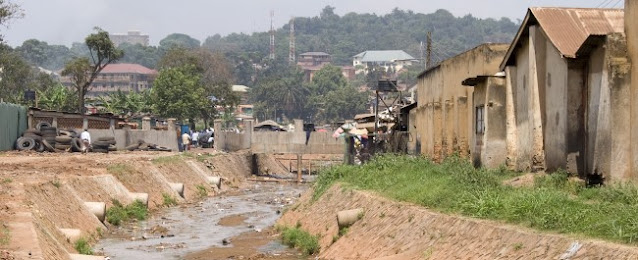
In early 2021, I observed a meeting of 25 people working on climate change policy in Bristol as part of my research into creating a just and fair climate transition. I was struck by how the conversation was dominated by one group: white men. From that moment, inequality in decision-making became a major part of my climate justice research.
I drew a table in my notebook with four headings: white men, white women, minoritised men and minoritised women. Every time someone spoke, I put a tick in the relevant column. By the end of that meeting, white men had three times as many ticks as the rest combined. I took a picture of the table and sent it to my research partner, Alice Venn.
“Should I keep recording this data?” I asked. Venn approved of this approach, so data on gender and race became central to our study.
We observed various meetings including steering groups, member consultations and board meetings for nine hours over the course of six months. During that time, white men spoke for 64% of the time and represented 40% of participants. A slightly higher percentage (41%) of white women were present in the meetings we observed, but they spoke for just 33% of the time.
By comparison, minoritised women made up 14% of participants in meetings and spoke 2% of the time. Minoritised men made up 5% of participants in meetings and spoke only 1% of the time.
This is no great surprise. The environment sector is notoriously one of the least diverse, with only 3.5% of people working in environmental jobs identifying as being from an ethnic minority. In the environmental charity sector, that figure is 6%. This compares quite starkly with an average across the UK workforce of 15% of employees from racial or ethnic minorities.
Diverse voices and critical discussions are key to making robust, inclusive and future-proof decisions. If a group of people who come from similar backgrounds (whether because of race, class or gender) assess a decision they are making for flaws, they are unlikely to find them because they are likely to agree with one another.
There may then be unexpected pushback against policies such as 15-minute neighbourhoods (where residents can reach all the facilities they need within a 15-minute walk, bike ride or journey on public transport), because groups who do not benefit from those schemes have not been consulted and their dissent has not been anticipated.
In Bristol, our observations of meetings found that participants showed very little critical engagement with existing policies, such as cycling route safety planning that centred around men commuting, or expansion plans for Bristol airport. Often, there was no space or time in meetings to be critical of existing ideas and narratives, or to challenge existing policy processes and systemic problems.
Climate justice was only mentioned in one of the nine meetings we observed. Climate vulnerability was not mentioned at all. Meetings felt very busy, filled with packed agendas, with little opportunity to make radical suggestions for change.
Changing the dynamic
Even with a mix of women and men or representative examples of minoritised people in the room, these people won’t necessarily speak up. Women are less likely to have influence in board meetings and struggle to be heard in online meetings.
A good chair will be aware of these dynamics and take steps to ensure inclusivity, perhaps by setting up small group tasks to build confidence or monitoring who is speaking and calling on quieter people directly.
Another technique, known as the “2-2 method”, involves asking “what are two reasons someone would agree, and two someone would disagree?” before opening the floor for critique. An open workplace culture where people feel they can trust leadership even if they are critical is also important, and will make more open and inclusive meetings easier to conduct.
From observations in our study, women tend to take longer to answer a question, which gives space for men to jump in or interrupt. One of the female participants told us: “I notice men tend to talk over me and interrupt me, a lot.”
Minoritised individuals may be more reticent to speak if they feel they won’t be listened to. Previous research shows that some board members worry they will be tokenised by being asked to represent huge groups – this puts undue pressure on them to be the spokesperson for their race or ethnicity, and does not treat them as an individual with worthy opinions. Being aware of these dynamics and getting it right as an employer or community leader is key to making change and ensuring everyone feels able to speak up.
A diversity redesign
As a follow-up from our study, we are training members of the environment sector in Bristol. We have been working with the UK-wide, equalities-led social enterprise The Diversity Trust and video production company Beeston Media to provide a series of workshops and videos about making more inclusive decisions, creating an open workplace culture, and recruiting and retaining diverse staff.
So far we’ve held three workshops, each attended by more than 25 people from a wide range of sectors and organisations. Three more workshops are planned for spring and summer 2024.
As a result, the Bristol Advisory Committee on Climate Change has already changed its recruitment policies. The committee has widened its definition of an expert, moving away from a research-based definition and explicitly noting that lived experience and community knowledge can be accepted as expertise.
Meeting space policies have also been redesigned at several organisations – for example, by implementing the 2-2 method and ensuring that chairs avoid tokenism and use micro-affirmations to build confidence.
We are monitoring the impact of these changes with one-to-one support calls, surveys and peer-to-peer support groups. One testimony stated that “the training you have been running has been so valuable in helping environmental organisations to develop better equality, diversity and inclusion practice”.
Improvements to embrace a more diverse and inclusive environmental sector are critical to ensuring a greener, fairer and more sustainable future for all. But this transition needs to be designed with people, rather than imposed on them. The shift can begin in a boardroom, steering group, or committee meeting. Any institution that pays attention to how it makes decisions, and who is consulted, will help to ensure the green transition is as inclusive as possible.
————————–
This blog is written by Dr Alix Dietzel, Senior Lecturer in Climate Justice, and Associate Director of Impact at the Cabot Institute for the Environment. This article is republished from The Conversation under a Creative Commons license. Read the original article.












